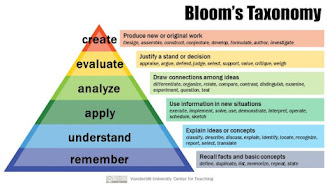First, a little background on Maslow and Bloom.
Abraham Maslow was an American psychologist. His hierarchy of needs framework is a popular theory of motivation. In this theory, Maslow states that our actions are motivated by our physiological needs. Most often this is represented by a pyramid, with the most basic needs at the bottom and the more complex needs at the top, as pictured below.
Benjamin Bloom, also developed a theory around how children learn, called Bloom's Taxonomy. This framework suggested that various levels of skills and abilities are how children learn. This pyramid is shared below.
Many educators have heard the term; "You need to Maslow before Bloom." Basically, this means that before a child can ever learn, their basic human needs to be met first. This fact, while present before the world-wide pandemic, was brought to the forefront during the pandemic and after. Kids are coming in to schools today without having their basic needs being met! During the pandemic, our children were isolated. Isolated from extended family and from their peers, as well. This leads to what many in the education field are calling "Learning Loss." I will jump up on that pedestal and say to you, "They lost a hell of a lot more than just their learning." The students we are seeing now have strong social and emotional needs. Check out this chart below:
This is a chart showing the last time students of varying grade levels had a "normal" school year. Abraham Maslow will argue that these children, now labeled The Pandemic Kids, will not be able to meet the stringent guidelines set up by some arbitrary textbook printing company until their basic needs are met. If these needs are not being met for a child, there is no way that they will be able to meet the demands of "Learning Loss."
Social-Emotional Learning is now more important than it's ever been. SEL is not about teaching the student what to think. It is about teaching the child how to relate to any given topic in regard to their own perspectives and environment. It's too bad that the importance of this has been politicalized to the point of being something bad. It is merely a universal means of getting a high quality education that prepares them for school, work, and life. The whole world has been going through something the likes of which many of us have ever seen.
The core principles of SEL have been a part of educational philosophy for ages. When our kids were in school, it was called "Life Skills" class. Same thing. Different words. The educational world does that a lot; changes labels on things.
What SEL does do is to help kids (and adults) learn to regulate themselves in ways that will help them get along in school and within their communities. If SEL is prioritized in schools, our students can learn, in a safe, non-threatening environment. It gives our kids a sense of belonging, a feeling of being valued, which is super-important to social and academic success. Social and emotional skills kids learn can include goal setting, stress management, team building, and learning perspectives of others.
Schools that have implemented strong SEL programs have dedicated time to practice social/emotional skills, opportunities for the students to have buy-in (such as helping to plan the class expectations), within a strong and supportive environment, and this is one component of what will help combat "Learning Loss." My other thoughts of Learning Loss is for another blog...


